

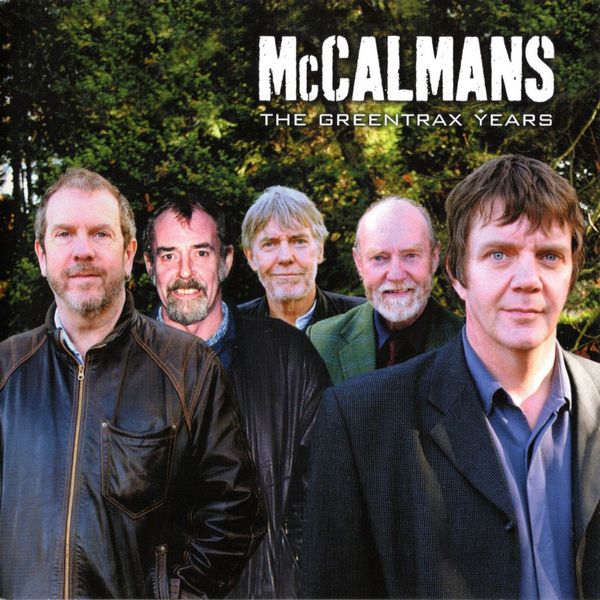 |
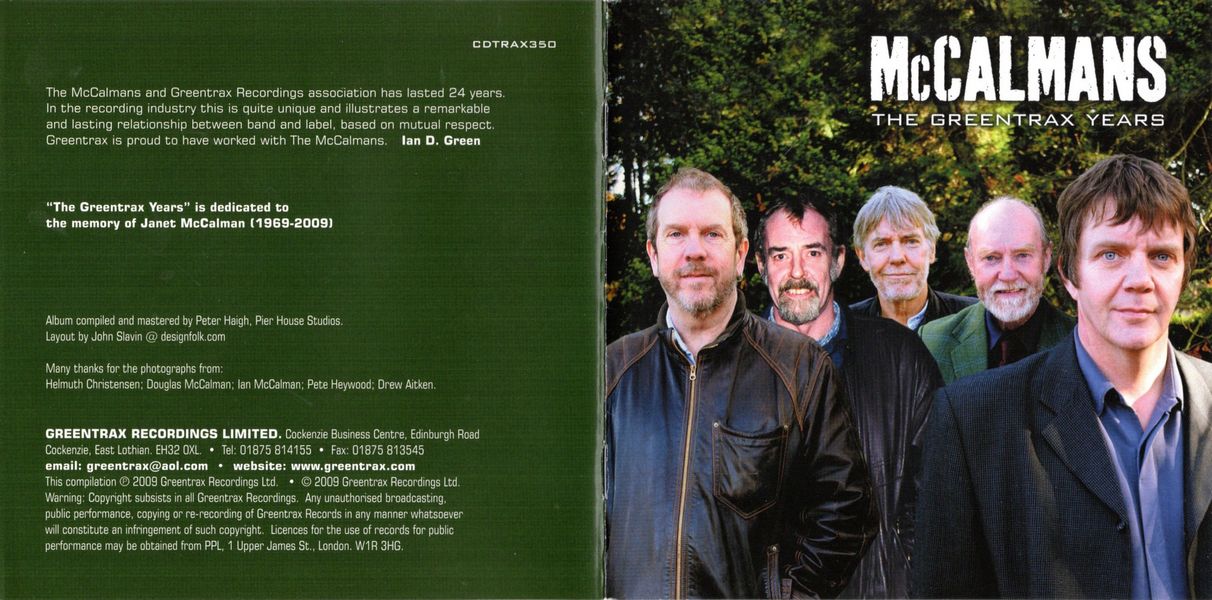
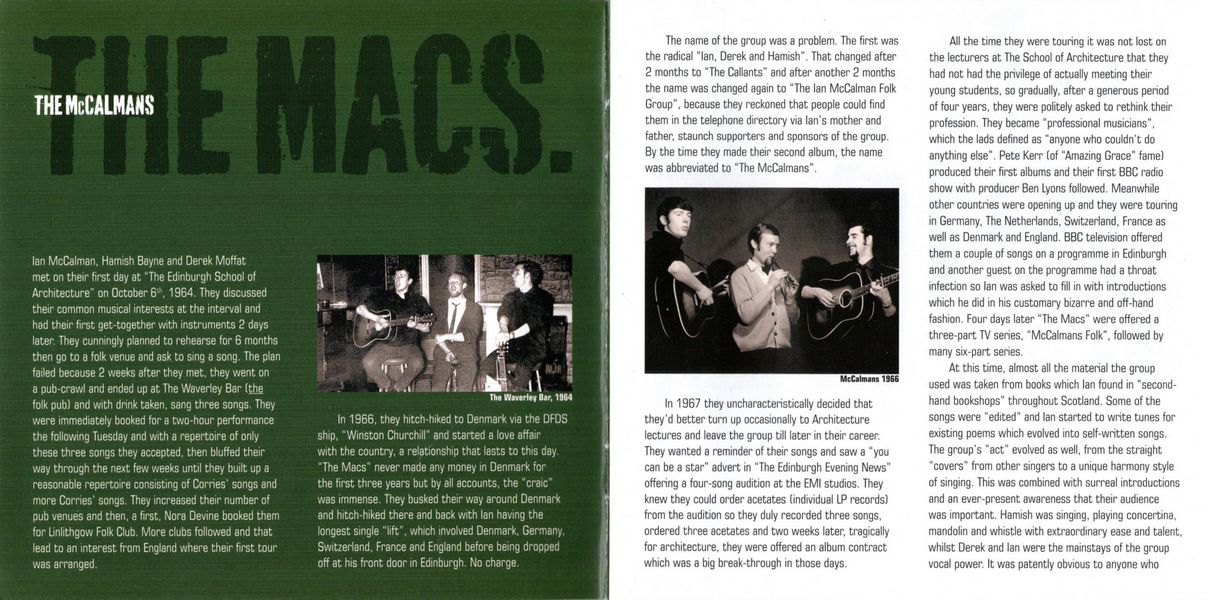
|
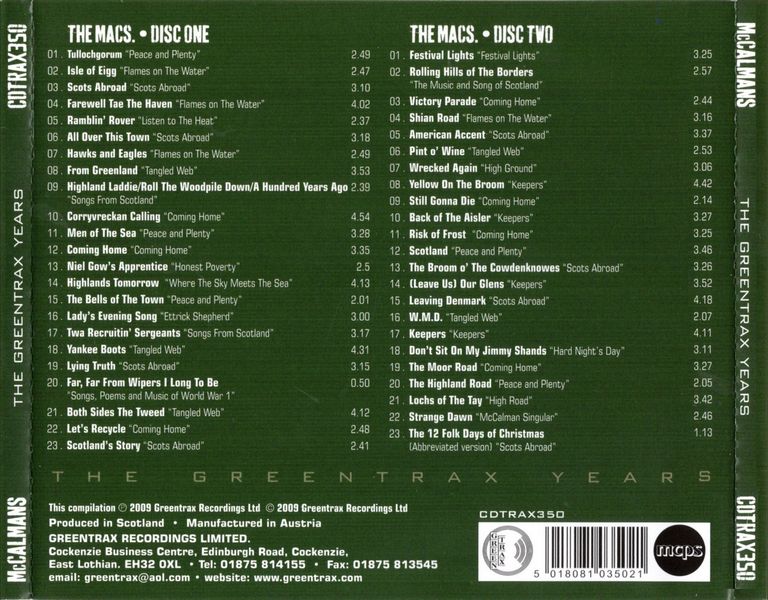
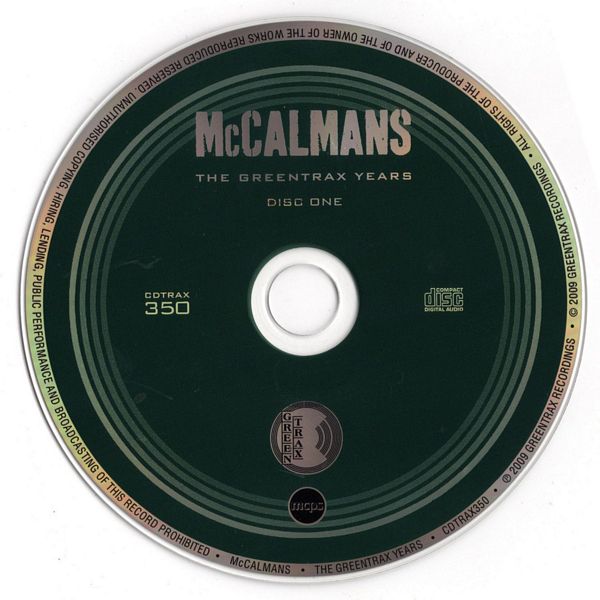
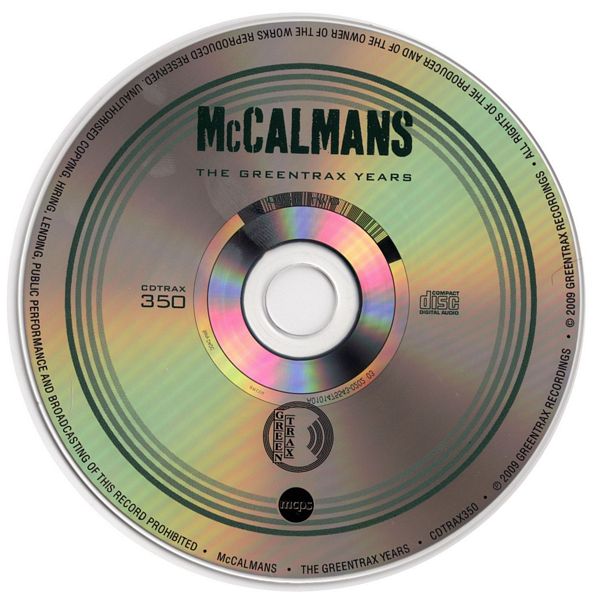
|
| more images |
Sleeve Notes
The McCalmans and Greentrax Recordings association has lasted 24 years. In the recording industry this is quite unique and illustrates a remarkable and lasting relationship between band and label, based on mutual respect. Greentrax is proud to have worked with The McCalmans.
Ian D. Green
Ian McCalman, Hamish Bayne and Derek Moffat met on their first day at "The Edinburgh School of Architecture" on October 6th, 1964. They discussed their common musical interests at the interval and had their first get-together with instruments 2 days later. They cunningly planned to rehearse for 6 months then go to a folk venue and ask to sing a song. The plan failed because 2 weeks after they met, they went on a pub-crawl and ended up at The Waverley Bar (the folk pub) and with drink taken, sang three songs. They were immediately booked for a two-hour performance the following Tuesday and with a repertoire of only these three songs they accepted, then bluffed their way through the next few weeks until they built up a reasonable repertoire consisting of Corries' songs and more Corries' songs. They increased their number of pub venues and then, a first, Nora Devine booked them for Linlithgow Folk Club. More clubs followed and that lead to an interest from England where their first tour was arranged.
In 1966, they hitch-hiked to Denmark via the DFDS ship, "Winston Churchill" and started a love affair with the country, a relationship that lasts to this day. "The Macs" never made any money in Denmark for the first three years but by all accounts, the "craic" was immense. They busked their way around Denmark and hitch-hiked there and back with Ian having the longest single "lift", which involved Denmark, Germany, Switzerland, France and England before being dropped off at his front door in Edinburgh. No charge.
The name of the group was a problem. The first was the radical "Ian, Derek and Hamish". That changed after 2 months to "The Callants" and after another 2 months the name was changed again to "The Ian McCalman Folk Group", because they reckoned that people could find them in the telephone directory via Ian's mother and father, staunch supporters and sponsors of the group. By the time they made their second album, the name was abbreviated to "The McCalmans".
In 1967 they uncharacteristically decided that they'd better turn up occasionally to Architecture lectures and leave the group till later in their career. They wanted a reminder of their songs and saw a "you can be a star" advert in "The Edinburgh Evening News" offering a four-song audition at the EMI studios. They knew they could order acetates (individual LP records) from the audition so they duly recorded three songs, ordered three acetates and two weeks later, tragically for architecture, they were offered an album contract which was a big break-through in those days.
All the time they were touring it was not lost on the lecturers at The School of Architecture that they had not had the privilege of actually meeting their young students, so gradually, after a generous period of four years, they were politely asked to rethink their profession. They became "professional musicians", which the lads defined as "anyone who couldn't do anything else". Pete Kerr (of "Amazing Grace" fame) produced their first albums and their first BBC radio show with producer Ben Lyons followed. Meanwhile other countries were opening up and they were touring in Germany, The Netherlands, Switzerland, France as well as Denmark and England. BBC television offered them a couple of songs on a programme in Edinburgh and another guest on the programme had a throat infection so Ian was asked to fill in with introductions which he did in his customary bizarre and off-hand fashion. Four days later "The Macs" were offered a three-part TV series, "McCalmans Folk", followed by many six-part series.
At this time, almost all the material the group used was taken from books which Ian found in "secondhand bookshops" throughout Scotland. Some of the songs were "edited" and Ian started to write tunes for existing poems which evolved into self-written songs. The group's "act" evolved as well, from the straight "covers" from other singers to a unique harmony style of singing. This was combined with surreal introductions and an ever-present awareness that their audience was important. Hamish was singing, playing concertina, mandolin and whistle with extraordinary ease and talent, whilst Derek and Ian were the mainstays of the group vocal power. It was patently obvious to anyone who listened that this was a group who formed out of a love of music and they were damned if any commercial interests were going to come in the way. On the back of their television work they were asked to do a tour of the biggest concert venues in Scotland. They filled every hall and after the tour, turned down a repeat tour saying that they preferred the folk clubs. That's what they did and no promoter could talk them out of it.
During the seventies and eighties, the group also sung in many of the trouble spots in the world. They were perceived as big laddies who could stand a bit of rough stuff so they played in Belize (riots), Cyprus (invasion by the Turks), Benbecula (drink) Salalah and Masirah (Gulf of Oman, don't ask), The Falkland Islands and other places too difficult to spell.
They also sung with Harry Secombe to Prince Charles and shared many drinks with them both in the Officers' Mess afterwards. "The Official Secrets Act" has made it impossible to discuss what happened in detail but Ian has always said that if he doesn't get his Knighthood, the truth will out!
Tours of Australasia, America, Africa and Europe were commonplace and The Macs sang their songs wherever they felt they'd have a good time. They also sung in the clubs of England and Scotland with one of the highlights being the "Fuzzfolk" police folk club in Edinburgh organised by a friend of Ian's father, Ian Green. Maybe more of him later.
Hamish left the band in a rare fit of sanity in 1982 and was replaced by Nick Keir who had experienced his own crazy adventures with "Finn McCuill", the muchloved folk rock band of the seventies. Ian had listened to Nick several times and had liked the man, his singing and his playing but it was after a performance at the Edinburgh Folk Club that Ian and Derek decided to ask Nick to join the group, Overtures were made and it was obvious after the first try-out that the Nick/Ian/Derek combination was going to work. It was still a few months before Hamish was due to leave the group and during that time, the new group recorded their first album, "Bonnie Bands Again", for release on the day of their first gig in Linlithgow (for historic reasons). The night went brilliantly and the band went south on what they thought would be a "triumphant" tour of England and experienced "the worst gig ever" in Whitehaven. The day after this disaster they managed to get into the next gig venue early and spent 6 hours changing songs, arrangements, intros and attitude. It worked and the tour was a reasonable success. They next toured in Shetland and then to Australia and New Zealand. These tours honed the skills and sorted out the material for all that was to follow.
"The McCalmans" managed a second album ("Ancestral Manoeuvres") on their own label with the "new" group but there were rumours that Ian and June Green, who had been running a discount record business, were going to form a recording company, "Greentrax". Ian and June had known The Macs for years and were good friends with the McCalman family. When Ian Green asked them to make an album, "The Macs" jumped at the chance and made "Peace and Plenty", TRAX002, which received a "gold disc". A great union was formed and since then, The Macs have recorded some 180 songs for "Greentrax".
Ian, Derek and Nick went on to make more television series, including a character-building series for Grampian Television in the Highlands of Scotland during the worst summer weather ever recorded. They still rate that as one of the highlights of their career. More albums for Greentrax were recorded and many more major tours were embarked upon.
By this time, song-writing was to the fore in the group's musical output and Nick and Ian were writing songs which were being covered by other bands.
At some of the early gigs with Nick in the band, a young lad with a distinctive voice, Stephen Quigg, asked the band if it was OK to do a warm-up spot. They liked his singing and when Stephen asked them if he could organise a Scottish Highland tour, the group accepted. They thought that the concerts would be a bit "light on time" so they asked Stephen to join them as the "warm-up". The Macs continued these Highland tours for almost 20 years with that format but in 2001, Nick and Ian heard the news they had suspected for months; Derek had cancer. He died in October of that year and this is an extract from Dick Gaughan's thoughts at the time: "Had you gone into Bell's on any Saturday lunchtime you would have found at least a dozen singers in full voice, usually with the McCalmans and myself roaring away at the centre of it. I know those three voices as well as I know my own. And soaring high above all of us was always Derek's. "He had one of the clearest voices I ever heard and we would sing everything from Beach Boys to Bothy Ballad. When we got thrown out of the pub we'd head back to one of our flats, usually ours on the third floor of number 47 and carry on singing. These days, you'd have to mortgage your house to put on a concert with the people who sat on the floor in 47 Forrest Road singing all night. Or playing darts. Or just sitting around being silly."
Nick and Ian had talked to Derek about the group ending but he was adamant that it should continue without him. All three decided that Stephen should be asked and he duly joined the group. The Macs knew there would never be another Derek, Stephen most of all, but Stephen added a subtle lightness to the group and for the second time in its existence, positives came from negatives and the group kept building. Another "positive" was that Stephen could drive and not only could he drive, but he didn't drink alcohol; a remarkable combination and achievement in the folk scene. Ian was the only driver for 20 years and suddenly he was released. Maybe not all the spinoffs were positive then.
Stephen has now made 3 CDs with The McCalmans on Greentrax. The total Macs output on Greentrax is 12 albums and a total of 26 albums with all companies over the years. The group has gone from strength to strength with Stephen and has triumphed despite what he and Nick have both gone through, namely; "aye, it's no' like the old days". Well, thank goodness for that, because they've now recorded over 400 different songs and have always thrust their humour, their music and their political comment upon a largely unsuspecting public.
It has been a long road for The McCalmans but Hamish, Stephen, Nick and Ian (plus Derek in his day) have always accepted that "Greentrax" came along at just the right time. This is an album from a group that came together as friends because of a common interest in music. They are still friends and they still play music.
Tullochgorum — This is a fitting start to the "Greentrax Years". It was the first track recorded, by us, for "Greentrax" and it provides the text which gave us the first album title, "Peace and Plenty". Written by The Reverend John Skinner, Robert Burns described it in 1787 as "the best Scotch song ever Scotland saw". Must be good then.
Isle Of Eigg — Actually, this Robin Laing song was stolen/researohed from the singing of young Stephen Quigg, many years before he joined the band. He performed it on all the early Highland tours so it's his fault we stole it.
Scots Abroad — They boldly go where no man has gone before. We meet ex-Scots in every country we visit and they try to convince us they're happy there. How dare they? Ian used his 45 years of touring experience when he wrote this. "There's an old man in the corner with a sad whisky eye … ". We know him. We are him!
Farewell Tae The Haven — "Flames" was recorded against the backdrop of Scotland's 1990 Rugby Grand Slam and with help from the likes of Phil Cunningham, it turned into a great experience. This is a song by our great mate, Davy Steele. We still miss Davy a lot.
Ramblin' Rover — It really was boiling, that night in Balerno … a packed house and Derek at his best, singing this Andy M. Stewart song, incidentally, here's a tip about recording "live" albums. Don't get all your friends and relations to come along, because they spend the first hour catching up on the gossip. We had to delay the concert for an hour.
All Over This Town — This was the title track of Nick's second solo album and was shamelessly stolen by the group. We're like vultures, circling round and round, then when we hear a good song, we strike. Remember that.
Hawks And Eagles — OK, this song is almost an anachronism but it was very relevant when it was written by lain Walker and also when we recorded it in 1990. We asked Phil Cunningham to play a "forceful Cajun rhythm" and with the bass and percussion of Martin and Drew Talbot, it's pretty "hot" for the old Macs. A German television station asked us to change the song on a live performance because they thought it was too political. Really!
From Greenland — Ian wrote this reflective song when he saw the wild geese returning to Scotland. They get involved in "seasonal touring" as do "The Macs".
Highland Laddie, Roll The Woodpile Down & A Hundred Years Ago — Testosterone, synchronised shouting and proud of it. Stan Hugill's, "Shanties From the Seven Seas", is one of the great folk collections and a well-thumbed book in Ian's house.
Corryvreckan Calling — We think this is one of Nick's best. Driving ambition to reach a seemingly unattainable goal and the girl in this song managed to achieve her dream.
Men Of The Sea — The Ian/Nick/Derek first version of the band thought that the Dolphin Hotel, Cleethorpes was the best venue in England and the club's residents, The Broadside", the best band. Bill Meek and John Connolly supplied us with countless songs, this being one of the quieter efforts.
Coming Home — Steven Clark wrote this as "Coming Home" but many sing it as "Coming Hame" which is OK until you try and rhyme the verses, but, it still works. Many political songs are idealistic and why not? They should be.
Niel Gow's Apprentice — Michael Marra is an idiosyncratic and quirky writer. His surreal imagery, added to a slightly reluctant performance style, has put him in danger of becoming a bit of a national treasure. He's a good lad as well.
Highlands Tomorrow — Ian's song of escape. The Highland Tour has been a "Macs" feature for years. Midges, rain, cramped stages, and the best backstage area in the world … the view from behind the hall at Acharacle. It's a tax-loss tour of mind-boggling proportions but we wouldn't miss it for anything. Arts Cooncil grant please? Nae chance!
The Bells Of The Town — This was a tough one to learn: alternate bars of 5/4 and 6/4 in the chorus, Once it was performed in a Balkan restaurant in Germany in exchange for glasses of bright blue liqueur. We managed 11/8 and 7/3 for the last two verses, which has never been achieved before or since. So proud.
Lady's Evening Song — This was Hamish's last studio album with the Macs and it was quite a departure, using only the poems and songs of James Hogg. Hamish preferred to limit his solo singing but he managed very well when asked. The album was engineered by the legendary Bill Leader, Great days.
Twa Recruitin' Sergeants — 90% of the songs on this album are contemporary and fairly unknown, yet we can guarantee that some reviewers will say " … and many predictable favourites like 'Twa Recruitin' Sergeants'". Bless them. The group still suffers from the early TV days when they were pressured into singing weel-kent "classics", but this one is worth doing any time. Yes, we do prefer the Jeannie Robertson version.
Yankee Boots — Jez Lowe is another English writer with phenomenal talent and we've covered a few of his songs. This one has never lost its relevance.
Lying Truth — Unequivocal accusation of religious and political hypocrisy. Aye, you can throw in bigotry as well. Ian wrote this one, so, no surprise there.
Far, Far From Wipers I Long To Be — The Macs' songs increasingly addressed the serious issues of our land. There's a direct link from the Black Watch Recruiting Sergeant via the WW1 trenches to Iraq. The song was recorded using two microphones with Hamish (founder member) playing concertina facing Stephen (the most recent addition) who sang.
Both Sires The Tweed — The text was written by James Hogg but Dick Gaughan put a cracker of a tune to it. If you can fight your way through the smoke and coffee, Dick is a magic guy to talk to.
Let's Recycle — It's not often that local government leaflets are set to music. The basic recycling guidelines listed here originated from Midlothian Council. Ian then manipulated them into rhyme so that he could remember the hundreds of facts listed. It is essential listening if you want to stay out of prison.
Scotland's Story — "The Proclaimers" have never been short of original lyrics and we are delighted to see them go from strength to strength with their music. They're a great advert for Scotland and a further example of "good lads". Fortunately, Craig and Charlie are also Hibs supporters so they are accustomed to a complete disregard of the easy option hence their challenging songs.*
Festival Lights — This song by Nick is one of our "most-requested". It is an inescapable truth that there is an enormous amount of "sitting around doing nothing" on any given folk tour. This is also called a "complete waste of time". The frustration caused by this waste of time occasionally manifests itself in wistful home thoughts. Edinburgh at Festival time.
Rolling Hills Of The Borders — Matt McGinn's song could have been tailor-made for Derek. The influence of Matt's songs stretch further than you might think. We were lucky enough to sing with Pete Seeger a few years back and he talked to us of Matt and his songs with great affection. We had a few magic nights with Matt, mainly festivals, but it was the "round-the-table" stories that were remembered the most.
Victory Parade — Ian's song of the First World War recruitment came after his involvement with the Greentrax project, "Far, Far From Ypres". It was impossible to commit to such a project without being affected by the horror and tragedy of it all.
Shian Road — "The Shian Road" is a few hundred yards south of Appin village hall. It has hardly changed in the fifty years since Ian holidayed there with his family in the bonny house, "Ardselma".
American Accent — Originally from Nick's solo CD "All Over This Town", this is an acute observation of the singing style influences of the fifties and sixties. As Nick says, "when the Americans sing in an American accent, it's great, but when a Scot tries it … not so good!". It's about that special moment when you discover your own heritage and embrace it.
Wrecked Again — Ian was on a ship (here we go) and had an evening relationship with a small bar therein. In the morning he found a piece of paper on which was scribbled these immortal words: "Jings, crivvens, am wrecked again. Take me away from a' the pain and the sufferin'." The real suffering that this man goes through for his art is beyond words.
Pint O' Wine — This is a Stephen Quigg alternative to the Burns' classic. The album, "Tangled Web", was on our own label and these "Macs" albums were only produced because of the prolific output of the group. In other words, we released a couple of extra albums during "The Greentrax Years" for the punters who wanted the new songs. Ian Green was OK with that and, truth be known, I think he was pleased to see the back of us for a few months. Every time we phoned him to say we were ready to record another Greentrax album we allowed a pause so that he could take his medicines.
Yellow On The Broom — Adam McNaughtan is a genius and his gift of finding the right words at the right time is second to none. It's a song of "the travelling people".
Still Gonna Die — We've deliberately followed Adam's song, "Yellow on the Broom" with this one, written by Shel Silverstein. Nick and Stephen heard Adam singing "Still Gonna Die" at a "Greentrax" concert at the Queens Hall in Edinburgh and immediately thought that the group could sing it. We reckon that if Adam sings a song then the definitive version has already been done, but we gave it a good shot.
Back O' The Aisler — This song was a "must" for the album. It's a good song and an honest one but it is also the only song that Derek ever penned. We were a bit frustrated when he turned up with "Aisler" after ail these years because we wondered how many songs he could have written had he put his mind to it. That's Moffat though.
When The Risk Of Frost Is Over — The Miners' Strike of 1984 affected the Lothians badly. Ian lived near Bilston Glen Colliery at the time and the group performed various concerts for the miners but this song is about the bitterness still felt today about the blackleg miners who broke the strike. The colliery has gone but it is still possible to walk around the area. That's where the song was written.
Scotland — Ian was devastated when the first vote for devolution was not successful. As usual the "Parcel of Rogues in a Nation" timed their changed allegiances perfectly.
The Broom O' The Cowdenknowes — We first sung this song in the sixties, thanks to Archie Fisher who still does a great version. It is reckoned to date back to the 17th century. Cowdenknowes is near Earlston in the borders of Scotland.
(Leave Us) Our Glens — From the repertoire of the matchless "Scotland the What?" team.
Leaving Denmark — On a tour of Australia, Ian was interviewed on ABC radio and was asked: "What is your favourite country outside Scotland?". The answer was supposed to be "Australia" of course, but Ian said: "Denmark, but Australia is second". Not good enough. They never worked in Australia again. Singing it is Stephen, at his best.
W.M.D. — In 2002 Hans Blix headed a commission to find weapons of mass destruction in Iraq. He found none and was basically sacked by Bush, who said that "the Iraq regime continues to possess and conceal some of the most lethal weapons ever devised". That's when Ian wrote this song.
Keepers — The demise of manned lighthouses is well documented by Nick in this gentle song. The last Lighthouse Keeper from Fair Isle North came to see the band in Aberdeenshire and requested Nick's song, which is surely the ultimate compliment.
Don't Sit On My Jimmy Shands — Richard Thomson wrote this song about the "worth more than gold" Beltona brand, Jimmy Shand 78s. If you don't know what we're talking about then you are at least one life experience short of a full existence.
The Moor Road — We play the "small but perfectly formed" Kingarth hotel on Bute every year. Kilchattan Bay, nearby, is where Ian's late father was born and the family still has a house within easy reach of the Moor road across to Rothesay. Although it is one of the most beautiful roads we still feel we should get a free pint from the hotel for the free advertising. Look! Isn't that a pig flying over there?
The Highland Road — This was the title song that kicked off a six-part Grampian television series filmed all over the Highlands. What a great bunch we worked with and what great laughs. 48 songs in different locations and we prerecorded them all in two evenings. The kids today? They don't know they're horn. Subsides mumbling.
Lochs Of The Tay — Jim Malcolm is one of the major song-writing talents in Scotland. He's no mean performer either and Hick and Ian persuaded "Greentrax" to let them record Jim for the company when he was a mere lad. He's written some great songs over the years and this was one of his first.
Strange Dawn — Ian was grateful to the other group members for including this song which, strictly speaking, is not a "McCalmans"' song. It recalls the early October morning when the news came that Derek had finally passed away. Derek died of cancer in 2001.
The 12 Folk Days Of Christmas — The abbreviated version. We sang the full version of this song when we were presented with "The Hamish Henderson Award for Services to Traditional Music" at the Queens Hall in Edinburgh. The BBC kindly let us use the recording but we feel that the whole song would be pushing your patience a little too much so we've cut it down to the nitty-gritty last verse. It ends the album just to reinforce our belief that recordings are good but, you can't beat the "live" experience. Enjoy your music, listening and performing.